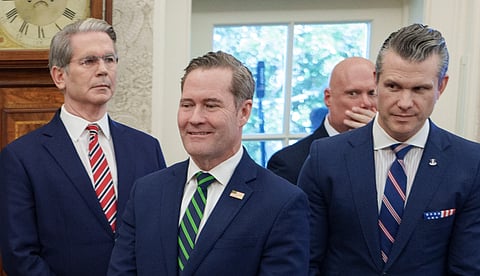

South Korea and the United States have agreed to develop a trade package aimed at averting new U.S. tariffs before a temporary pause on reciprocal duties expires in July, Seoul’s delegation announced following initial negotiations in Washington.
U.S. Treasury Secretary Scott Bessent described Thursday’s meeting as "very successful," signaling potential progress. "We may be moving faster than I thought, and we will be discussing technical terms as early as next week," he told reporters.
Bessent and U.S. Trade Representative Jamieson Greer met with South Korean Finance Minister Choi Sang-mok and Industry Minister Ahn Duk-geun. While neither side disclosed specific agreements, South Korean officials struck a more cautious tone, calling the talks a productive start but emphasizing that further discussions would be needed.
In a statement, South Korea requested exemptions from U.S. reciprocal and item-specific tariffs while proposing cooperation in shipbuilding, energy, and reducing trade imbalances.
"We had a very good start today," Ahn said. "We agreed to hold working-level talks next week to define the scope and structure of negotiations, with the goal of finalizing a 'July package' by July 8."
Choi confirmed that additional talks would take place in Seoul on May 15–16 with Greer, focusing on four key areas: tariffs and non-tariff measures, economic security, investment cooperation, and currency policy.
Despite U.S. optimism, trade analysts remain skeptical that a deal will be reached before South Korea’s presidential election in June.
Former Trade Minister Yeo Han-koo noted differing perceptions of the negotiations, with South Korea signaling a preference for a deal closer to the July deadline, while Bessent suggested an "agreement on understanding" could emerge as early as next week.
The talks coincide with broader U.S. efforts to negotiate tariff agreements with key allies. South Korea, facing a 25% reciprocal tariff, is among the first countries targeted by the Trump administration’s renewed trade push. Similar discussions were held last week with Japan, which faces 24% tariffs.
Choi emphasized South Korea’s concerns over the auto sector, which stands to be hardest hit by the tariffs. Separately, Seoul and Washington agreed to hold Treasury-level discussions on currency policy at Bessent’s request.
Defense cost-sharing, a contentious issue in past U.S.-South Korea negotiations, was not raised during the talks, Choi confirmed. President Donald Trump had previously linked trade and defense spending, but Seoul maintains the two issues are separate.
South Korean officials also clarified that renegotiating the 2007 bilateral free trade agreement—revised during Trump’s first term—was not discussed.
The negotiations face complications from South Korea’s upcoming June election, triggered by the ouster of former President Yoon Suk Yeol over his brief imposition of martial law in December. Prime Minister Han Duck-soo, serving as acting president, has expressed willingness to reach a deal, citing the U.S.’s historical support for South Korea.
However, the opposition Democratic Party (DP), favored to win the election, has criticized the government for rushing negotiations. DP spokesperson Cho Seung-rae demanded an immediate halt to the talks, arguing that an interim administration lacks the mandate to make binding commitments.
"The prime minister of an impeachment government has no authority to finalize such a deal," Yeo Han-koo said.
Separately, the Trump administration is reportedly planning an energy security summit in Alaska in June, where it hopes South Korea and Japan will commit to the Alaska LNG project. Ahn stated that Seoul is still reviewing the proposal and consulting with other major LNG importers.
The U.S. also raised concerns over South Korea’s digital trade barriers, citing a 2025 report that criticized regulations on network usage fees, data transfers, and competition.
As negotiations continue, observers warn that political uncertainty in Seoul could delay any major breakthroughs before the July deadline.